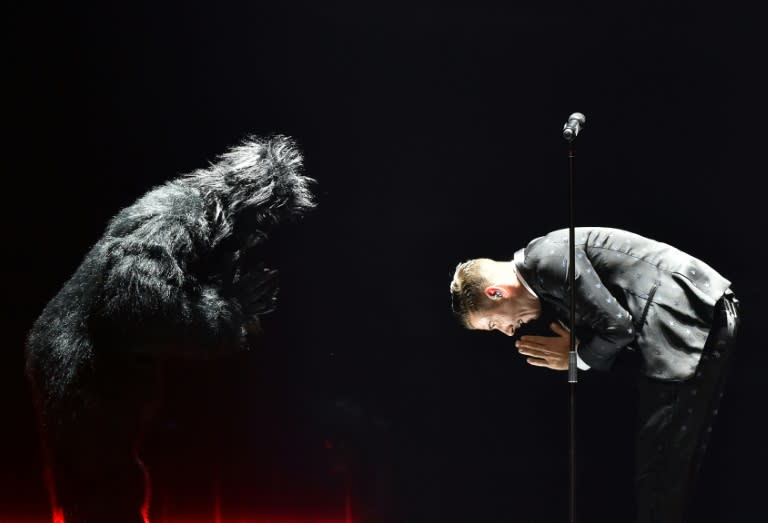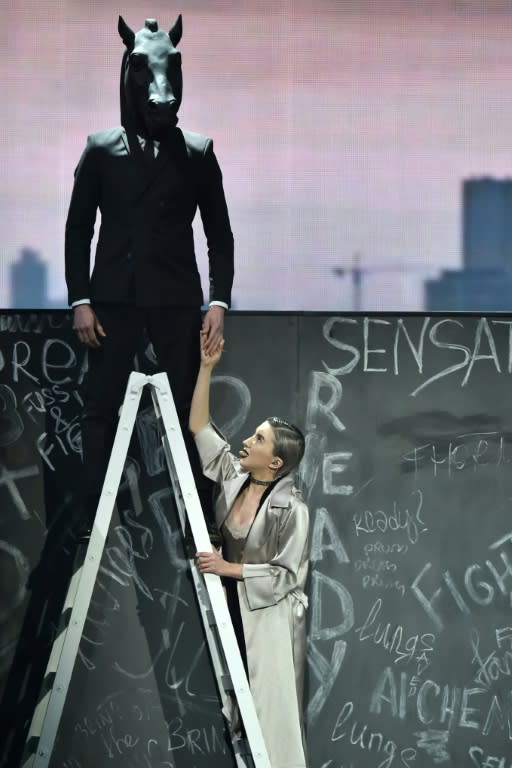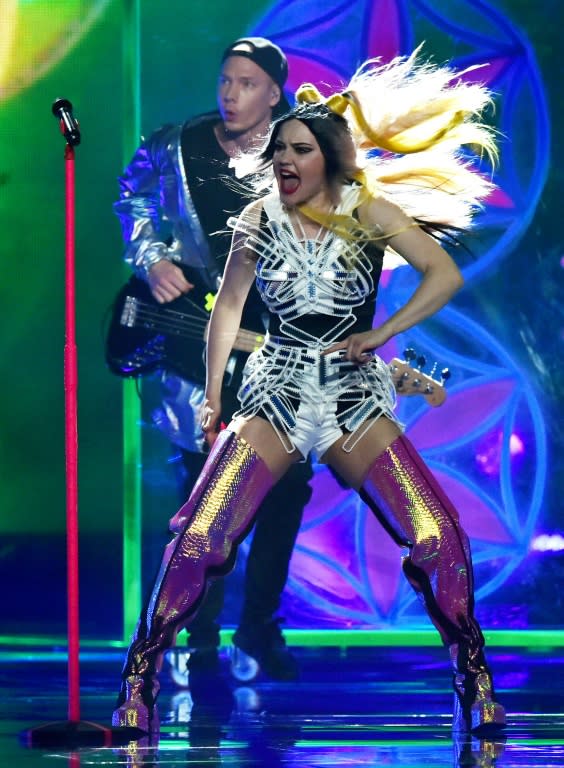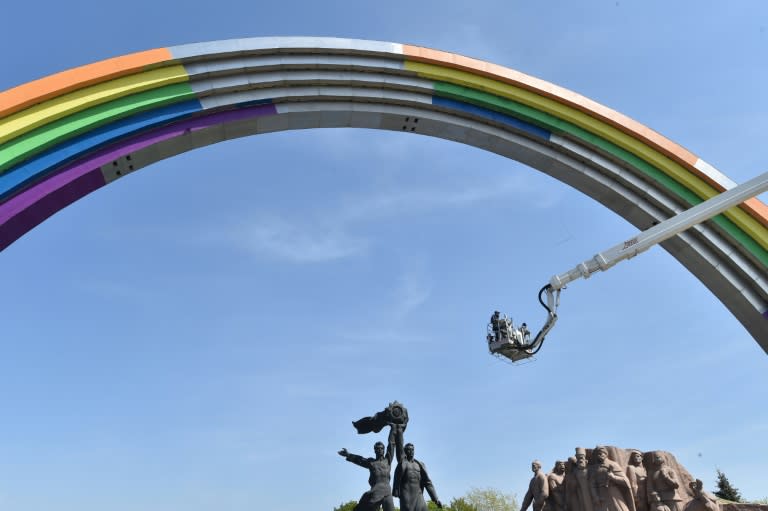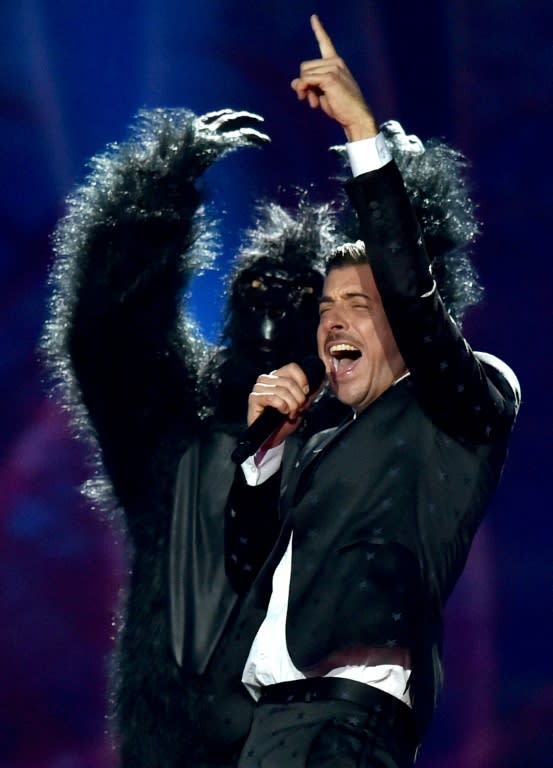Kiev goes ape for Eurovision as banned Russia fumes
With a dancing "gorilla" as the red-hot favourite and flamboyant fashion throughout, the kitsch Eurovision Song Contest climaxes Saturday following a simmering political feud between Russia and Ukraine. The televised extravaganza that gave the world 1970s Swedish supergroup ABBA is famous for raucous parties after which audiences and juries from across Europe vote for what some sceptics call the least offensive display of poor taste. But this year's competition has added importance as it gives Ukraine a chance to showcase a new face to the world for the first time since a bloody 2014 pro-EU revolution pulled the former Soviet nation out of Russia's orbit. Ukrainian President Petro Poroshenko said the global TV audience will witness "our European aspirations, our fight for freedom and independence" as a war with Russian-backed insurgents drags on 500 kilometres (300 miles) to the east. The bookmakers' pick to win the final is the stylish Italian crooner Francesco Gabbani and his acrobatic if somewhat puzzling partner in a hairy black gorilla suit. Less fancied is Azerbaijan's entry featuring brooding heroine Dihaj singing next to a man standing on a tripod ladder and wearing a horse's head. And Romania's duet of Ilinca and Alex Florea may be the first to mix rap with yodelling on the big stage. It is all in keeping with Eurovision's 62-year tradition of celebrating quirkiness and glamour that has been especially embraced by the LGBT community and those up for a night of laughs. - Russia not impressed - Fans have flocked to Kiev after Ukraine's Jamala won last year's event in Sweden with a ballad about the Soviet persecution of her ethnic Tatar people in Crimea. Ukraine's sworn foe Russia was not impressed. The Kremlin had already been ostracised by the West for annexing Crimea in 2014 and then backing a three-year separatist war in eastern Ukraine that has killed more than 10,000 people. Passions were inflamed only further when Russia's own 2016 entry was pipped at the post by Jamala. The ill-will spilled over into one of the biggest scandals Eurovision has seen in years. Moscow's pick for 2017 was a wheelchair-bound singer with a charismatic smile and a dreamy voice named Julia Samoilova. But Kiev quickly banned her from entering the country as punishment for holding a 2015 concert in Crimea -- a region almost the entire world still views as Ukrainian. A furore followed during which Ukraine was threatened with expulsion from future competitions and Russia turned down offers for Samoilova to perform by video link or be replaced. Exasperated organisers were eventually forced to drop Russia from the contest after its state broadcaster decided not to air Eurovision in protest. Ukraine's own media company accused Moscow of trying to undermine Kiev's reputation by picking a contestant it knew would be barred. - Homophobic strains - Yet it takes more than international politics to stop Eurovision, and legions of enthusiasts and delegations from 42 nations have swarmed fanzones set up around sun-kissed onion dome churches and along Kiev's buzzing main thoroughfare. They were greeted by a sparkling city whose art deco buildings have been spruced up with a new lick of paint that bears little resemblance to one lined with barbed-wire barricades three years ago. Leafy streets are filled with cafe tables and stalls selling traditional Ukrainian wares and dishes. And a gigantic titanium arch once built to symbolise Ukraine's friendship with Russia began being painted with the rainbow colours of the unofficial LGBT flag. It was meant to reflect the contest's "Celebrate Diversity" motto and needle Russia's internationally condemned law banning so-called gay propaganda. Yet homophobic undercurrents also run through mostly Christian Orthodox Ukraine. Militants from the right-wing group Pravy Sektor forced the city to abandon the rainbow before it was finished and the arch now sports metallic blank spots that look like a metaphor for the LGBT community's incomplete quest for acceptance. - 'We are all apes' - The contest itself will see Italy's Gabbani strut out on stage as the odds-on favourite with his upbeat "Occidentali's Karma." It starts out as rather standard fare by Eurovision standards: Gabbani -- decked out in a tailored black suit and impeccable dress shoes -- croons alone. Then he is joined by the gorilla. The two wave their arms in rhythm to the music before the "wild beast" breaks off into something in-between breakdancing and spasmic convulsions. The Tuscany native said the song was based on philosophical treatises on self-perception. "I played on the fact that behind our way of being intellectuals, in reality we are all apes with some clothes," the 34-year-old explained.

